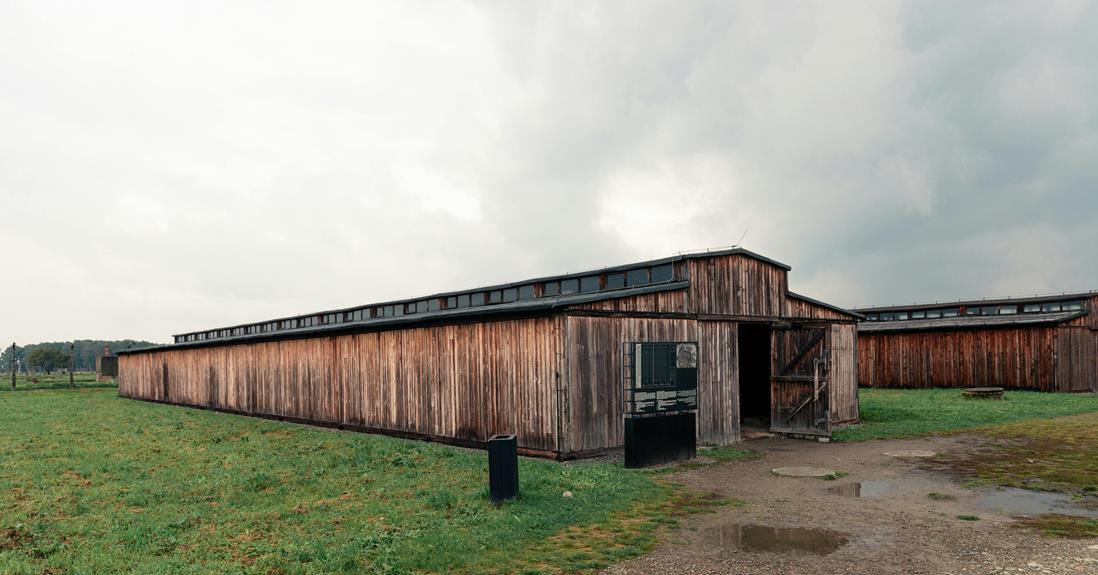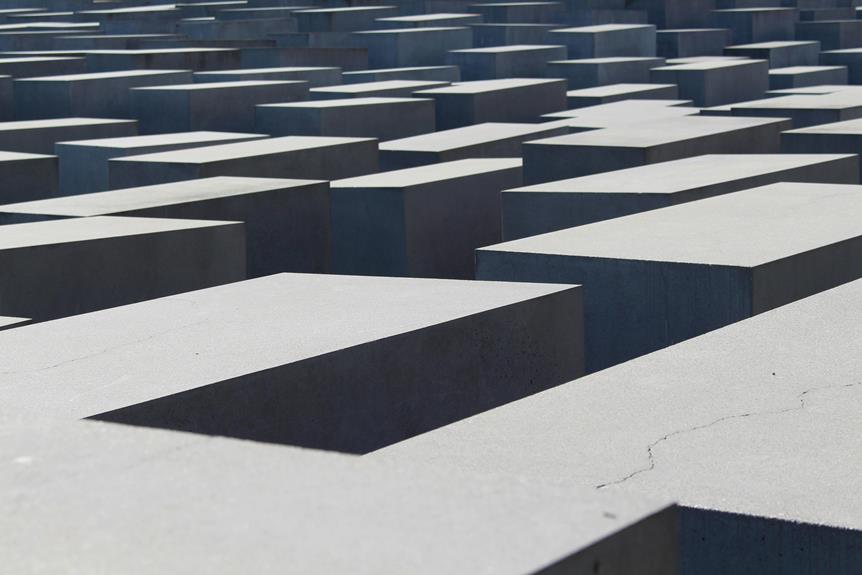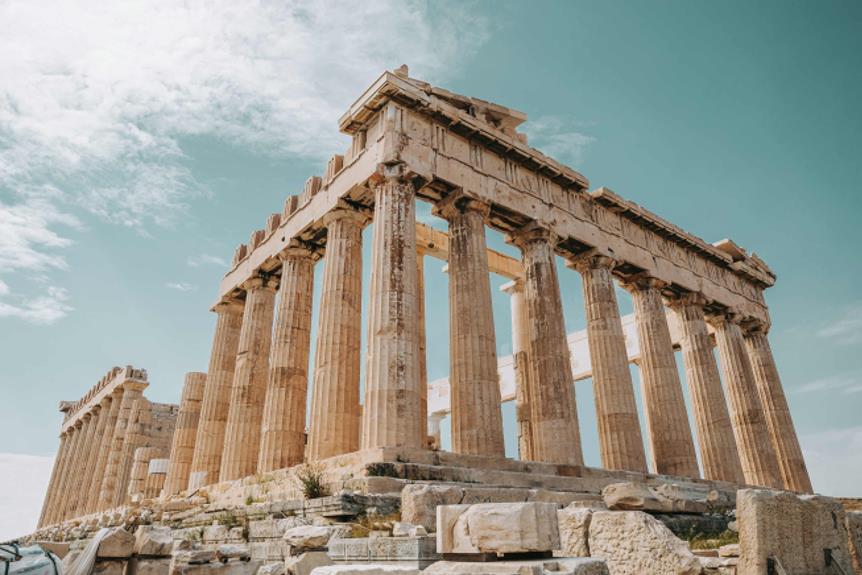Nestled in the picturesque landscape of Austria, Mauthausen holds a somber history that transcends time. The echoes of suffering and resilience within the walls of the Mauthausen-Gusen Concentration Camp serve as a poignant reminder of the darkest chapters of human civilization. As we explore the lasting impact on survivors and the ongoing efforts to educate and commemorate, a deeper understanding of Mauthausen's significance emerges. This site not only reveals the depths of human cruelty but also the enduring strength of the human spirit in the face of unimaginable adversity.
Key Takeaways
- Mauthausen was a Nazi concentration camp in Austria during WWII.
- The camp witnessed unimaginable horrors and acts of defiance.
- Survivors faced psychological trauma and physical health issues.
- Educational programs raise awareness about the Holocaust.
- Mauthausen's legacy highlights the resilience of survivors.
Historical Background
Nestled amid the serene landscapes of Austria, the historical background of Mauthausen unfolds with a harrowing tale of human suffering and resilience during the tumultuous period of World War II. The Nazi atrocities committed in Mauthausen stand as a stark reminder of the depths of inhumanity that humanity is capable of. The town witnessed unimaginable horrors as it became a focal point for the Nazi regime's brutalities.
During this dark chapter of history, the people of Mauthausen exemplified remarkable wartime resistance in the face of overwhelming adversity. Acts of defiance, both big and small, were carried out by individuals who refused to succumb to the oppression that surrounded them. These acts, though seemingly insignificant in the grand scheme of the Nazi regime's control, were powerful displays of the undying human spirit that longed for freedom and justice.
The echoes of the past still resonate in Mauthausen, serving as a poignant reminder of the atrocities that occurred and the unwavering spirit of those who fought against them. As we reflect on the historical background of Mauthausen, we honor those who endured unimaginable suffering and commend those who dared to resist, holding onto the hope of a brighter future even in the darkest of times.
Mauthausen-Gusen Concentration Camp
The Mauthausen-Gusen Concentration Camp, a site synonymous with unparalleled suffering and cruelty, stands as a chilling witness to the atrocities committed during World War II. The impact on survivors of such a harrowing experience is profound and long-lasting. Educational programs play a vital role in guaranteeing that the memory of the camp's horrors is preserved and that future generations learn from the past.
Impact on Survivors:
- Psychological Trauma: Survivors of Mauthausen-Gusen often carry deep psychological scars, experiencing nightmares, anxiety, and post-traumatic stress disorder.
- Physical Health Issues: Many survivors suffered long-term physical health consequences due to malnutrition, forced labor, and medical experiments.
- Survivor's Guilt: Those who lived through the horrors of the camp often struggle with survivor's guilt, questioning why they survived when so many others perished.
Educational Programs:
- Holocaust Education: Educational programs focused on the Holocaust and specifically on Mauthausen-Gusen help raise awareness about the atrocities committed and the importance of standing up against discrimination and hatred.
- Visits to the Camp: Organized visits to the camp provide an opportunity for students and visitors to learn about the camp's history firsthand, fostering empathy and understanding.
- Testimonies and Documentation: Documenting and sharing survivors' testimonies through educational initiatives ensures that their stories are preserved for future generations, serving as a reminder of the consequences of intolerance and extremism.
Liberation and Aftermath
Following the liberation of Mauthausen-Gusen Concentration Camp, the harrowing aftermath revealed the extent of human suffering and the challenges faced by survivors in rebuilding their lives. Survivor stories from Mauthausen paint a grim picture of the psychological effects of the camp's brutality. Many liberated individuals struggled with severe trauma, survivor's guilt, and a profound sense of loss. The physical and emotional scars left by the camp's atrocities would continue to haunt survivors long after their release.
The psychological impact on survivors was profound, with many experiencing nightmares, anxiety, and a deep distrust of others. Reintegrating into society proved to be a monumental task, as survivors grappled with the memories of their ordeal and the loss of loved ones. The liberation, while a moment of joy and relief, marked the beginning of a new chapter filled with uncertainties and challenges.
In the aftermath of liberation, efforts were made to provide support and care for survivors. Medical professionals, social workers, and humanitarian organizations worked tirelessly to help survivors cope with their trauma and rebuild their lives. Despite these efforts, the scars of Mauthausen ran deep, leaving a lasting impact on the survivors and their families. The legacy of Mauthausen serves as a stark reminder of the atrocities of the past and the resilience of those who survived.
Memorial Sites in Mauthausen
Numerous memorial sites in Mauthausen stand as solemn tributes to the lives lost and the enduring legacy of the camp's atrocities. These sites serve as poignant reminders of the horrors that occurred within the walls of the Mauthausen concentration camp.
The following elements provide a deeper understanding of the memorial sites in Mauthausen:
- Educational Programs: The memorial sites in Mauthausen offer a range of educational programs aimed at fostering awareness and remembrance. These programs include guided tours, exhibitions, and lectures that shed light on the history of the camp and the experiences of those who were imprisoned there. Through these initiatives, visitors can gain an in-depth understanding of the atrocities committed at Mauthausen and the importance of preserving the memory of the victims.
- Survivor Testimonies: Central to many of the memorial sites in Mauthausen are survivor testimonies. These personal accounts provide a humanizing perspective on the suffering endured by those held captive in the camp. By listening to these testimonies, visitors can grasp the profound impact of the Holocaust on individuals and society as a whole.
- Architectural Design and Memorial Symbolism: The architectural design of the memorial sites in Mauthausen is imbued with profound symbolism. From the stark structures to the symbolic artworks scattered throughout the grounds, every element serves to honor the memory of the victims and convey the magnitude of the atrocities committed. Through thoughtful design and symbolism, these memorials create a space for reflection, remembrance, and reverence.
The Danube River Connection
Inextricably intertwined with the history of Mauthausen lies the profound connection to the Danube River, a waterway that bore witness to both the suffering of prisoners and the complexities of human memory and remembrance. During World War II, the Danube River played a significant role in the transportation of prisoners to the Mauthausen concentration camp, serving as a grim pathway to their incarceration and often to their deaths.
The Danube River's WWII connections are deeply ingrained in the historical significance of Mauthausen. The river not only facilitated the movement of prisoners but also acted as a symbol of the broader reach of the atrocities committed during the war. Its waters, once a means of life and trade, were transformed into a conduit of suffering and loss.
Today, the Danube River stands as a poignant reminder of the dark chapters of history, with local monuments and memorials dotting its banks. These sites pay homage to the victims of Mauthausen, ensuring that their stories are not forgotten and that future generations learn from the horrors of the past. The presence of these monuments serves as a tribute to the resilience of the human spirit and the enduring commitment to upholding freedom and dignity for all.
Impact on Local Community
The impact of the Mauthausen concentration camp on the local community reverberates through generations, shaping collective memory and influencing socio-cultural dynamics in profound ways. The scars left by such a dark chapter in history are not only felt by those who directly experienced it but also by the broader community that surrounds the site.
Here are three key ways in which the Mauthausen concentration camp has impacted the local community:
- Community Involvement: The presence of the Mauthausen camp has led to increased community involvement in commemorative events and educational initiatives. Local residents often participate in memorial ceremonies, exhibitions, and discussions aimed at preserving the memory of the victims and educating future generations about the atrocities that took place.
- Cultural Integration: The Mauthausen camp serves as a stark reminder of the importance of cultural integration and understanding. The local community has been prompted to engage in dialogue about diversity, tolerance, and the dangers of discrimination. This has led to efforts to promote inclusivity and celebrate the richness of different cultures within the community.
- Historical Responsibility: The Mauthausen concentration camp has instilled a sense of historical responsibility within the local community. Residents feel compelled to make sure that the stories of the victims are never forgotten and that lessons are learned from the past to prevent such atrocities from happening again. This sense of responsibility drives ongoing efforts to commemorate the victims and educate others about the horrors of the Holocaust.
Visitor Information and Tours
Understanding the significance of providing accurate visitor information and engaging tours at the Mauthausen concentration camp is essential for fostering a meaningful and educational experience for those who come to learn about this somber chapter in history. Tour scheduling and visitor accommodations play a pivotal role in ensuring that guests can explore the site with ease and comfort.
Guided excursions led by knowledgeable staff can offer valuable insights into the camp's history, highlighting key areas of importance and providing detailed context. These tours are designed to be informative and thought-provoking, allowing visitors to engage with the material in a respectful and meaningful way.
For those who prefer a more introspective experience, self-exploration is also encouraged at Mauthausen. Visitors can wander through the grounds at their own pace, reflecting on the solemnity of the site and paying their respects to the victims in a personal manner. Information boards strategically placed throughout the camp offer additional details for self-guided tours, ensuring that visitors have access to in-depth information even without a guide.
Commemoration Events
Commemoration events at Mauthausen serve as poignant tributes to the lives lost and the enduring lessons of history that must never be forgotten. These events not only honor the memory of the victims but also educate current and future generations about the atrocities that occurred during the Holocaust.
The following aspects highlight the importance of these commemoration events:
- Survivor Testimonies and Educational Programs:
- Survivor testimonies provide firsthand accounts of the horrors experienced in Mauthausen, ensuring that the stories of the victims are preserved and shared.
- Educational programs offer insights into the historical context of the Holocaust, fostering understanding and empathy among visitors.
- International Collaborations and Documentary Films:
- International collaborations bring together individuals and organizations from around the world to commemorate the victims of Mauthausen, emphasizing the global significance of remembering the past.
- Documentary films capture the experiences of survivors, shedding light on the dark chapters of history and serving as powerful tools for education and remembrance.
Commemoration events at Mauthausen not only pay tribute to the victims but also serve as reminders of the importance of upholding freedom, dignity, and human rights for all. These events play an essential role in preserving the memory of the past and ensuring that such atrocities are never repeated.
Art and Literature Reflections
Reflecting the profound impact of the historical events commemorated at Mauthausen, Art and Literature serve as poignant mediums through which the enduring legacy of the victims is honored and preserved. Literature analysis and artistic interpretations deeply explore the atrocities committed during the Holocaust, offering insight into the human experience within the confines of the camp.
Literature surrounding Mauthausen often carries a weight of raw emotion and stark reality. Authors like Elie Wiesel and Primo Levi provide firsthand accounts of the horrors they witnessed, forcing readers to confront the unimaginable suffering faced by those imprisoned in the camp. Through their words, the resilience and spirit of the victims shine through, immortalizing their stories for future generations.
On the artistic front, visual representations of Mauthausen convey a depth of pain and suffering that words sometimes cannot capture. Paintings and sculptures depicting the harsh conditions of the camp, the skeletal figures of the prisoners, and the haunting presence of the gas chambers are powerful reminders of the inhumanity that took place. These artistic interpretations serve as a visual tribute to the resilience of the human spirit in the face of unimaginable evil.
| Title | Author | Description |
|---|---|---|
| Night | Elie Wiesel | Personal account of survival in Auschwitz |
| Survival in Auschwitz | Primo Levi | Reflections on human nature in the camp |
| The Pianist | Wladyslaw Szpilman | Memoir of a Jewish pianist's survival |
Lessons Learned and Moving Forward
In the aftermath of the harrowing events at Mauthausen, it is imperative to meticulously analyze the profound lessons garnered from the past to pave a path towards a more compassionate and just future. Through reflection and a commitment to healing, individuals and societies can work towards preventing such atrocities from occurring again.
Lessons Learned and Moving Forward:
- Education: Education plays a pivotal role in ensuring that the atrocities of Mauthausen are never forgotten. By incorporating the history of such events into school curriculums and public discourse, future generations can learn from the mistakes of the past and aim for a more tolerant and inclusive society.
- Reconciliation: True healing and progress can only occur through reconciliation. This involves acknowledging the pain and suffering caused, offering sincere apologies, and working towards building bridges between communities that have been affected by such traumatic events.
- Community Engagement: Encouraging active participation within communities to promote understanding and empathy is essential. By fostering open dialogues, organizing commemorative events, and supporting initiatives that promote peace and unity, individuals can contribute to the collective healing process and work towards a future free from discrimination and violence.
Frequently Asked Questions
Are There Any Ghost Stories or Paranormal Activities Reported at Mauthausen-Gusen Concentration Camp?
Paranormal encounters have long fascinated individuals seeking connections to the past. Exploring sites with historical significance can sometimes evoke tales of ghostly sightings or unexplained phenomena.
It is through these reported paranormal activities that individuals may find a unique way to engage with the history of a place and reflect on the past events that may have left an enduring impact on the environment.
What Are the Unique Challenges Faced by the Local Community Living Near the Memorial Site?
In the vicinity of such a poignant memorial site, the local community faces unique challenges that stem from both historical trauma and the responsibility to preserve the memory of those lost. Balancing the weight of the past with the needs of the present requires a delicate dance of honoring the past while building a sustainable future.
Local impact is not just historical but also ongoing, highlighting the importance of community support in managing these complex dynamics.
How Has the Art and Literature Community Responded to the History of Mauthausen, Austria?
Artistic responses and literary interpretations to historical events like those at Mauthausen, Austria, often serve as powerful mediums for conveying the depth of human experiences. Through various forms of expression, the art and literature community has the unique ability to evoke empathy, provoke reflection, and preserve memories.
Their responses can provide nuanced perspectives, challenge prevailing narratives, and contribute to the ongoing dialogue surrounding the complexities of history and its impact on society.
What Are Some Lesser-Known Facts About the Danube River's Connection to Mauthausen?
The Danube River's connection to Mauthausen holds historical significance beyond its scenic beauty. As a lifeline for trade and transport, it also served a darker purpose during World War II.
Lesser-known facts reveal how the river played a role in the logistics of the nearby concentration camp.
Today, the Danube stands as a somber reminder, flowing past the memorial site, echoing the local community's ongoing challenges in reconciling the past with the present.
Are There Any Special Ceremonies or Rituals Observed During Commemoration Events at the Site?
Ceremony traditions at commemoration events hold significant historical significance, fostering remembrance and honoring the lives lost. These rituals often include speeches, wreath layings, moments of silence, and symbolic gestures to pay homage to the victims.
Through these ceremonies, the community unites in solidarity, reflecting on the past while reaffirming a commitment to preserving memory and advocating for freedom. Such observances serve as a poignant reminder of the human cost of oppression and the importance of never forgetting.
Conclusion
To sum up, the haunting echoes of Mauthausen's past reverberate through the annals of history, a solemn reminder of the depths of human cruelty and the resilience of the human spirit.
Like a beacon of remembrance, Mauthausen stands as a tribute to the enduring legacy of those who suffered within its walls.
Let us continue to honor their memory, learn from the lessons of the past, and work towards a future built on justice and empathy.


